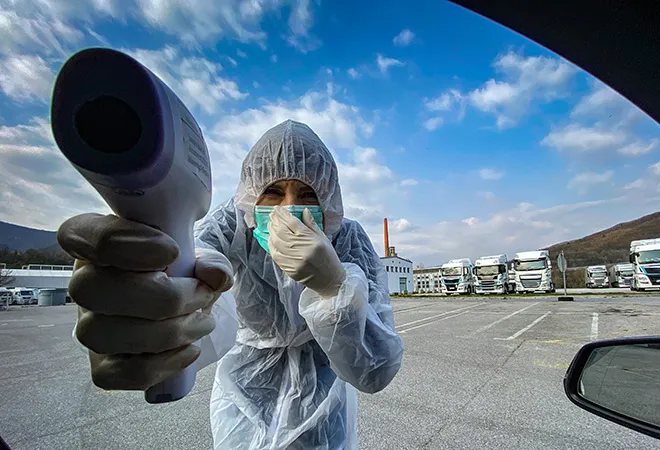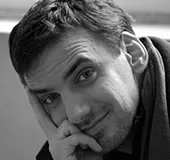-
CENTRES
Progammes & Centres
Location

When news broke in mid-May that Slovenia will be the first European country to be declared as “COVID-19 free”, the international media went into a bit of a frenzy.
The news of a small EU country was finally COVID-19 free and was re-opening its economy spread like wildfire across the globe.
The government of PM Janez Janša tried to paint the country as a model of post-covid-19 reopening. The reality is, naturally, slightly more complicated.
While Slovenia did manage to successfully curb the epidemic, this was done against the backdrop of a procurement scandal, government and health officials repeatedly failing to stay on-message, protest against executive overreach and (perceived) authoritarian tendencies, and a potentially destabilising political realignment.
Namely, while being presented to the international audience as a success story, the primary reason for a mid-May announcement of the epidemic’s end lay with public finances rather than public health.
To put it simply, Slovenian government was loath to extend its epidemic subsidies to its citizens and businesses for another month. This would have added another 1.5 billion euro to the 3 billion already spent. To prevent that, the government rushed to meet a deadline set forth in the initial legislative package on social and economic counter-epidemic measures.
By publishing the act on May 14 at 11:45 PM, they managed to beat the deadline by fifteen minutes. However, the act was to initially scheduled to enter into force only on 31 May. This in turn led to much confusion as to what exactly the act meant and when did it begin to apply.
Chaos was the consequence of the rush and the ill-thought-out manner in which the act was passed. This only fed into the general mistrust of the way the government had been handling the latter stages of the epidemic.
The statements often confused the citizens as officials from different departments contradicted one another. A series of high-profile replacements of heads of various government agencies, most notably the National Institute for Public Health (the key public health body in Slovenia) created an impression that this government valued loyalty above sound expert advice.
This became painfully apparent when a whistle-blower came forward and exposed alleged malpractices in government procurement of medical ventilators and personal protection equipment (PPE).
The whistle-blower’s statements were supported by several other people involved in the process. The pressure was brought to bear in signing contracts with specific providers even if their equipment was substandard, not certified or turned out to have wrongly declared.
A criminal investigation is ongoing but the issue immediately escalated into a huge scandal and, according to public opinion polls, political fallout is considerable. Not in the least because the scandal blew wind into a nascent protest movement, which had by then been simmering in people’s balconies and back yards.
Decrying repeated attempts at activating policing powers of the army and over-zealous lockdown measures were never conveyed or were even advised against by the epidemiologists, these were just practices from elsewhere in the world.
After the PPE scandal broke, a loophole was found in the lockdown measures and one of the most unique protest movements of the coronavirus age was born: a cycling protest.
Namely, while the relatively severe lockdown measures prohibited any sort of public assembly, they did permit recreational activities such as biking, providing social distancing rules were respected.
As a result, a bike protest was held in late April, with thousands of participants cycling around the government district in Ljubljana and, at the same time, in several other cities and towns. Participants ringed bells, tooted horns to grab the attention while maintaining social distance, making the crowd appear even larger than it was.
Initially, the protesters demanded the whistle-blower to be protected, corruption accusations investigated and those responsible brought to justice.
Soon thereafter, however, in an unrelated turn of events legislation was passed severely curtailing the role environmental NGOs in administrative and court proceedings concerning zoning, infrastructure projects and similar.
The uproar that followed caused the protests to be held repeatedly every Friday evening, thus morphing into a more general anti-government movement. This was further enflamed by government attempts to take over control of the public radio and television broadcaster RTV Slovenia, firing of the head of the criminal investigation bureau (the agency investigating the PPE scandal) and even the head of the national statistics office, for not giving enough priority to the government anti-epidemic efforts.
On the whole, protests are peacefully being carried out. Though the police are regularly issuing fines to random participants for violating social distancing measures which are still in place despite the official end of the epidemic.
The government’s reaction to the protest movement, however, has been livid. Spearheaded by the SDS (the largest coalition party led by PM Janša), through their privileged status in the society repeatedly attempted to paint the protesters as spoilt malcontents. .
People in close orbit to the ruling party and certain government officials continue to not mince words in their attempts at delegitimising the protests. In turn, the protesters have hardened their language as well and are now demanding that the government step down.
Be that as it may, the protesters’ demands are general and do not constitute a political agenda. Rather, they are a manifestation of the dissatisfaction with the way the government of PM Janša has been handling the post-epidemic exit strategy and how it tried to use the emergency to stymie civil society.
But while it is a force to be reckoned with, the movement has little potential to bring about change by itself.
For any significant realignment of political power to occur, the protest movement would somehow have to ally itself with opposition parties by tactfully adopting the specific demands and agenda of the movement. Since these are exactly the things the protest movement lacks (outside of the general demand that PM Janša and his government resign), chances of such an alliance are slim.
Even more, there seems little appetite on the part of the protesters themselves to have anything to do with the opposition parties. The few attempts of individual opposition politicians to participate in the protests and promote their parties’ agenda were largely mocked.
It is not just that there is not much love between the protesters and the opposition parties. There is not much love between the opposition parties themselves, either.
Until a few months ago, most of the opposition parties were running a minority government led by LMŠ boss Marjan Šarec. This ended in a political miscalculation that brought Janez Janša to power and the bad blood between former coalition partners had barely been subdued to a point where they were making an effort at coordinating their political moves. Thus, even in the extremely unlikely scenario that somehow the protesters force the Janša government to resign, chances of the opposition parties forming yet another coalition are very small.
To be completely fair, they have risen slightly in recent weeks as two SMC MPs joined the opposition ranks, leaving the Janša government with a single-vote majority in the parliament. But until such time that an alternative majority is established in the parliament, PM Janša can continue to govern, even if like his predecessor, he, too would end up with a minority government.
However, a single vote majority and continuous external pressure in the form of protests do create an element of instability that could, under certain circumstances, spiral out of control and bring aoubt either early elections of a technocratic government.
One such event is the upcoming no-confidence vote against minister of economy and SMC leader Zdravko Počivalšek for his role in the PPE scandal. A fraught and contentious debate is expected and a wafer-thin majority allows little room for error, especially for Počivalšek, who, lacks charisma and has precious little ability to rally the troops. Under the right circumstances, this can allow the opposition to throw the coalition parties off-balance and win votes. Although Počivalšek will likely win the no-confidence vote, the opposition parties are already playing a similar move against interior minister Hojs. Ironically, this tactic of continuous harassment was developed by Janša’s SDS during their time in opposition.
As the initial shock of the pandemic gave way to national effort of containing it, the post-pandemic realities are starting to kick in and the immediate future for many people and businesses is bleak. The unemployment is on the rise and the government’s macroeconomic office projects economy will contract at least 8% in 2020. How long the recovery will take largely depends on the state of Slovenian primary export markets as well the potential second wave of infections. Already, plans for that eventuality call for keeping as much of the economy as possible open, a stark departure from the initial response in March.
Together with reopening of the economy, Slovenia is experiencing a reopening of political divisions, temporarily hidden by the overreaching goal of taming the Covid-19 epidemic. Whatever political capital the government of Janez Janša has generated by its effective handling of the Covid-19 epidemic, this is being burnt rapidly by doubling down on controversial moves both in public health and other areas.
Should a second wave of the coronavirus infections indeed occur sometime in Autumn, this disintegration of trust between the government and a large part of its people may prove more of a liability than it seems now.
The views expressed above belong to the author(s). ORF research and analyses now available on Telegram! Click here to access our curated content — blogs, longforms and interviews.

Alja Pengov Bitenc is a Slovenian journalist political analyst and cohost of several podcasts on media and politics. He also authors Sleeping with Pengovsky a ...
Read More +